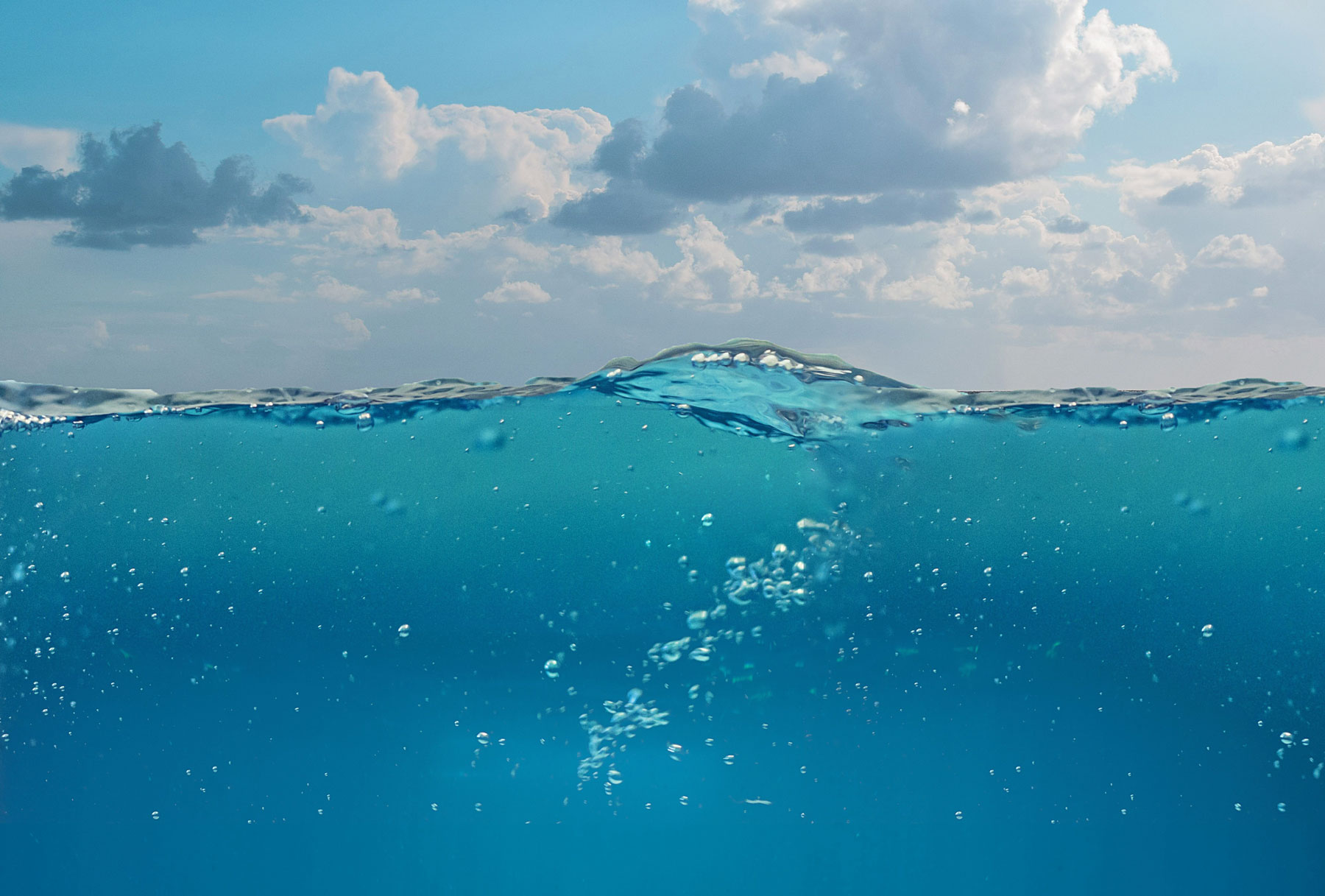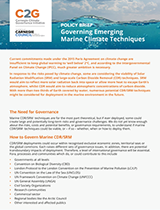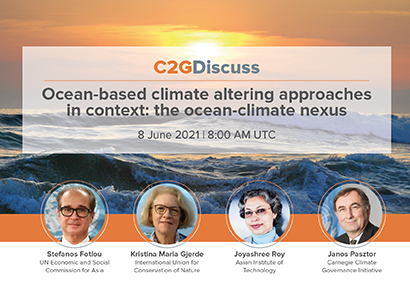Marine Cloud Brightening – A Governance Dilemma
A virtual side event for the
UN Ocean Conference
1 July 2022 at 11:00 WEST – 12:15 WEST
This event was recorded on 1 July 2022, and will also available with interpretation into 中文, Español and Français.
The Carnegie Climate Governance Initiative (C2G) and the Joint Group of Experts on the Scientific Aspects of Marine Environmental Protection (GESAMP) held this virtual joint side event, ‘Marine Cloud Brightening – A Governance Dilemma‘ on 1st July 2022, 11:00-12:15 WEST; during the UN Ocean Conference, held between 27 June-1 July 2022.
Actions and commitments made by countries under the Paris Agreement are insufficient to keep the global warming below 1.5 degrees Celsius to avoid catastrophic climate change, some vulnerable places in the world are already facing greatest impacts – the Great Barrier Reef has been severely damaged by marine heatwaves caused by climate change and is currently suffering its sixth mass bleaching. The IPCC 1.5 SP report predicted that up to 70% – 90% of coral reefs will have disappeared at 1.5C, more than 99% would be lost at 2C. To reduce bleaching on the reef, a group of Australian researchers and engineers are exploring and conducting outdoor experiments to test marine cloud brightening (MCB) locally which seeks to whiten clouds over the ocean to reflect solar radiation back into space in order to achieve cooling.
MCB, is one type of solar radiation modification (SRM), that may have the potential to protect the marine environment by reducing climate hazards, but it could create novel risks, ethical and governance challenges – particularly if scaled up in a global climate intervention. An outstanding challenge is the governance of its research, in particular concerns about research that might put society on a “slippery slope” towards deployment and create distractions from the essential focus on emission reductions and removals. Meanwhile, scientists, policymakers and societies across the world do not know enough about its potential benefits or risks to be able to make well informed decisions about its potential development or use. How to deal with this dilemma? How do we weigh up those concerns and the risks of not knowing whether or not SRM might be a potential additional climate response option? Can society learn from the MCB project that might advance the governance of SRM research?
This event brought together guest speakers from different backgrounds to share their insights on these challenging questions as a contribution to the thematic 3: Minimizing and addressing ocean acidification, deoxygenation and ocean warming.
Speakers
Miranda Boettcher, Associate, German Institute for International and Security Affairs
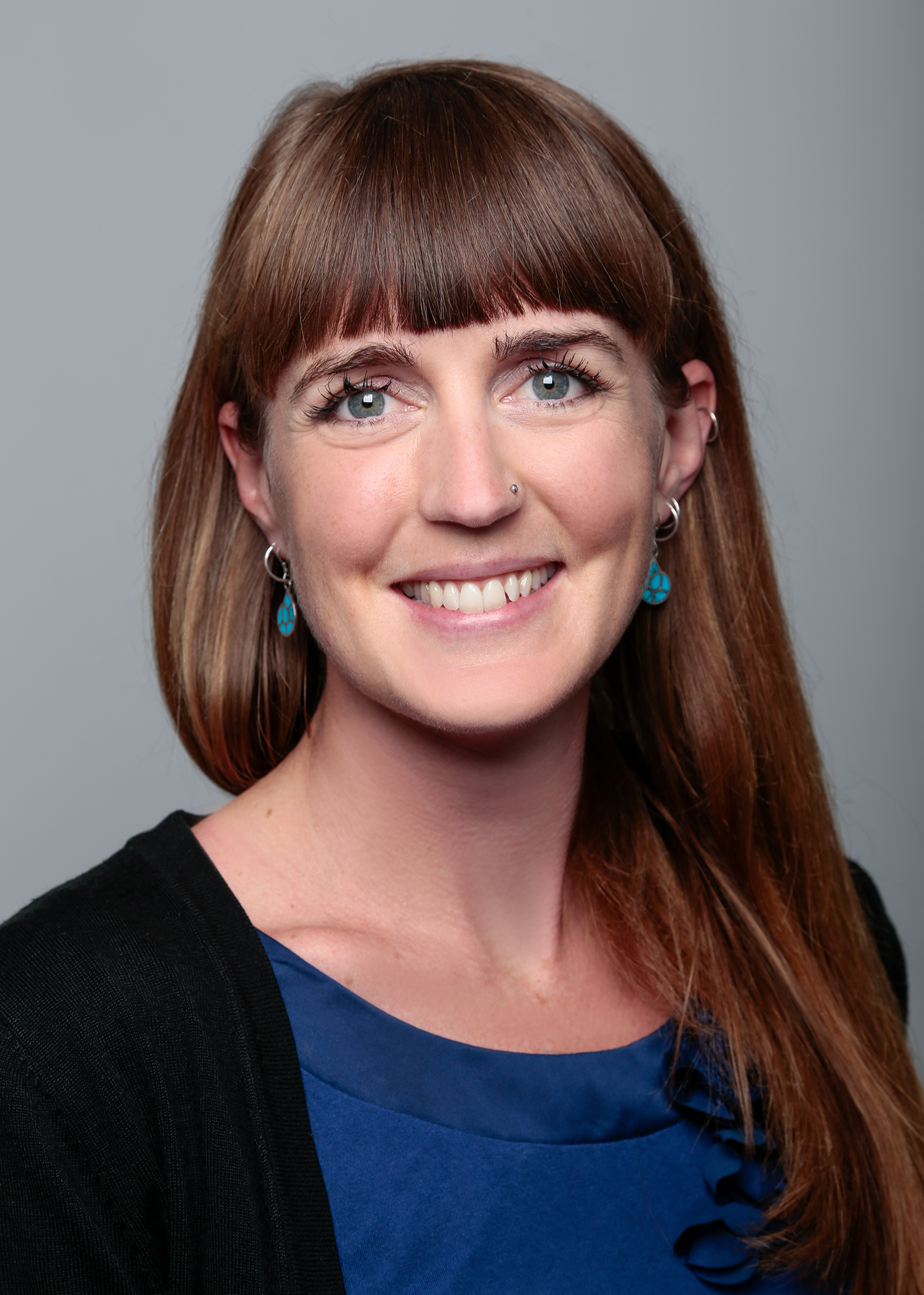 Miranda Boettcher is a Research Associate at the German Institute for International and Security Affairs (SWP) in Berlin, and an affiliated member of the Environmental Governance Section at the Copernicus Institute of Sustainable Development, Utrecht University, the Netherlands. She is currently working on the German-government (BMBF)-funded project ASMASYS (Unified ASsessment framework for proposed methods of MArine CDR and interim knowledge SYnthesiS), developing a transdisciplinary assessment framework for marine carbon removal, with a focus on identifying political (in)feasibility frontiers.
Miranda Boettcher is a Research Associate at the German Institute for International and Security Affairs (SWP) in Berlin, and an affiliated member of the Environmental Governance Section at the Copernicus Institute of Sustainable Development, Utrecht University, the Netherlands. She is currently working on the German-government (BMBF)-funded project ASMASYS (Unified ASsessment framework for proposed methods of MArine CDR and interim knowledge SYnthesiS), developing a transdisciplinary assessment framework for marine carbon removal, with a focus on identifying political (in)feasibility frontiers.
Additionally, Miranda is a member of the United Nations Joint Group of Experts on the Scientific Aspects of Marine Environmental Protection (GESAMP) Working Group 41: Ocean Interventions for Climate Mitigation. She is currently an Earth System Governance Research Fellow. She was an Oxford Martin Visiting Fellow at the University of Oxford’s Institute for Science, Innovation and Society in 2018, and a Visiting Researcher at the Australian-German Climate and Energy College at the University of Melbourne in 2019. She has previously worked as a Research Associate at the Institute for Advanced Sustainability Studies in Potsdam, Germany, Research Analyst for Foresight Intelligence in Berlin, Germany, an Investigator at the Mintz Group in San Francisco, USA, and a Research Assistant at the University of Heidelberg’s Department of International Relations in Heidelberg, Germany.
Simone Borg, Professor, Environmental & Resources Law, Faculty of Laws, University of Malta
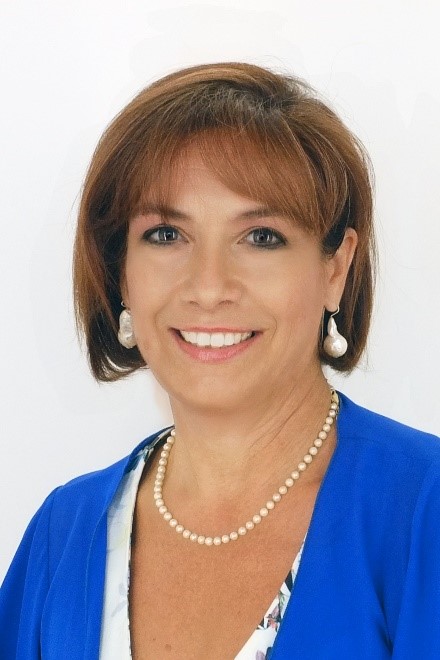 Professor Simone Borg LL.D, LL.M. (Int law), Ph.D (IMLI) is Professor, Environmental & Resources Law, Faculty of Laws, University of Malta. Prof Simone Borg read for a doctorate degree in laws (LL.D.) in 1991 and a Magister Juris degree in International in 1994 from the University of Malta. In 2009, she obtained her Ph.D. on the Conservation of Marine Natural Resources at the International Maritime Law Institute.
Professor Simone Borg LL.D, LL.M. (Int law), Ph.D (IMLI) is Professor, Environmental & Resources Law, Faculty of Laws, University of Malta. Prof Simone Borg read for a doctorate degree in laws (LL.D.) in 1991 and a Magister Juris degree in International in 1994 from the University of Malta. In 2009, she obtained her Ph.D. on the Conservation of Marine Natural Resources at the International Maritime Law Institute.
Prof Borg worked for the public sector from 1991 to 2004 first as a First Secretary with the Ministry of Foreign Affairs and then Head of the Legal and Multilateral Affairs Section within the Ministry of the Environment. During this time she was mainly responsible for negotiating Malta’s position in International Environmental Multilateral Agreements, the drafting of legislation and legal policy making in environmental law. She coordinated the transposition of the environmental and energy acquis communautaire during Malta’s negotiations to become an EU member State. She also participated in various research projects with the European Union and the United Nations. Prof Simone Borg served as the first Chairperson to Malta’s Occupational Health and Safety Authority.
Presently, she is Chair of the Institute for Climate Change and Sustainable Development, Head of Department of the Environmental law and Resources law within the Faculty of Laws at the University of Malta. Prof Borg is also a visiting lecturer at: the Catholic University of Leuven, the IMO’s International Maritime Law Institute and the University of Auckland in New Zealand. She has published law books as well as many articles and papers in law journals. She is a Co Chair of the Forum of European Legal Experts on Climate Change Adaptation and Chair of the Platform of University of Malta Academics on Climate Change. She is the director of the International Master of Arts Programme in Ocean Governance and a Fellow of the Sustainability Institute Bruges. Prof Simone is an Expert on the European Union Expert Team for Horizon 2020 SC5 Advisory Group.She has recently been awarded the Order of Merit by the President of France for her work in environmental law.
Daniel Harrison, Principal Investigator of the Marine Cloud Brightening for the Great Barrier Reef project, Sydney Institute of Marine Science
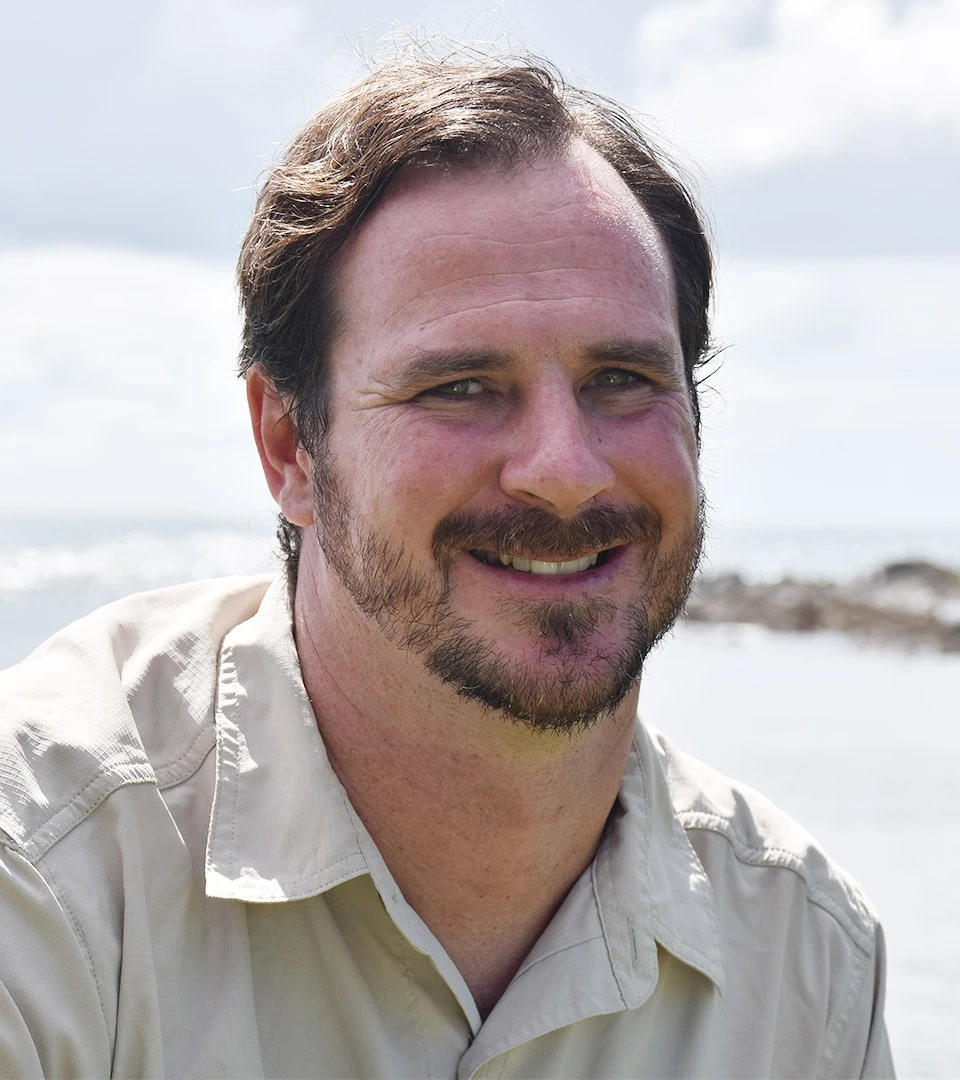 Dr Daniel Harrison is an oceanographer and engineer at the National Marine Science Centre of Southern Cross University. Daniel’s research focuses on how human activities affect the oceans and the role the ocean can play in providing novel solutions to the global challenges posed by a rapidly changing climate.
Dr Daniel Harrison is an oceanographer and engineer at the National Marine Science Centre of Southern Cross University. Daniel’s research focuses on how human activities affect the oceans and the role the ocean can play in providing novel solutions to the global challenges posed by a rapidly changing climate.
His research has covered the spectrum of estuarine microbiology and biogeochemistry, through global fisheries and aquaculture, to geoengineering and ocean-based carbon removal techniques. He was awarded a Myer Innovation Fellowship in 2017 to develop his concept of regional marine cloud brightening as a method for mitigating coral bleaching on the Great Barrier Reef.
He also holds appointments at University of Sydney and the Sydney Institute of Marine Science.
Jan McDonald, New Star Professor of Environmental and Climate Law, University of Tasmania
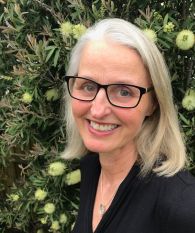
Jan McDonald is the New Star Professor of Environmental and Climate Law at the University of Tasmania.
Professor McDonald is Past President of the National Environmental Law Association and was a Contributing Author to the IPCC’s Fifth Assessment Report. She has taught, researched and published widely across a range of environmental law issues. Her current research spans the legal and policy dimensions of climate change adaptation and the emerging field of geoengineering governance. She currently teaches undergraduate units in climate change law and policy and environmental law and supervises a range of PhD students. Since joining the University of Tasmania, Professor McDonald has won over $3million in research funding, including five competitive grants relating to climate change response and adaptation.
Jan holds degrees in Arts and Law, with first class Honours in Law, from the University of Queensland. As a Fulbright postgraduate scholar, she graduated from Lewis and Clark Law school’s LLM in Environmental and Natural Resources Law summa cum laude and completed her PhD in international trade and forestry law at Bond University.
Before joining the University of Tasmania in 2011, Jan worked at Bond and Griffith Universities. She was Professor of Environmental Law and Head of Griffith Law School, then Director of the Griffith University Climate Change Response Program. In 2007, she led Griffith University’s successful bid to host the National Climate Change Adaptation Research Facility and served as NCCARF Establishment Director in 2007-2008.’
Jan has extensive experience in advising associations, governments and international organizations on legal issues related to environment and climate change.
Janos Pasztor, Executive Director, Carnegie Climate Governance Initiative (C2G)
 Janos Pasztor (a Hungarian and a Swiss citizen) is Senior Fellow of the Carnegie Council for Ethics in International Affairs, and is Executive Director of the Carnegie Climate Governance Initiative (C2G). He has four decades of work experience in the areas of energy, environment, climate change, and sustainable development. Before taking up his current assignment he was UN Assistant Secretary-General for Climate Change in New York under Secretary-General Ban Ki-moon.
Janos Pasztor (a Hungarian and a Swiss citizen) is Senior Fellow of the Carnegie Council for Ethics in International Affairs, and is Executive Director of the Carnegie Climate Governance Initiative (C2G). He has four decades of work experience in the areas of energy, environment, climate change, and sustainable development. Before taking up his current assignment he was UN Assistant Secretary-General for Climate Change in New York under Secretary-General Ban Ki-moon.
Earlier, he was Acting Executive Director for Conservation (2014), and Policy and Science Director (2012-2014), at WWF International. He directed the UNSG’s Climate Change Support Team (2008-2010) and later was Executive Secretary of the UNSG’s High-level Panel on Global Sustainability (2010-2012). In 2007 he directed the Geneva-based UN Environment Management Group (EMG). During 1993-2006 he worked and over time held many responsibilities at the Climate Change Secretariat (UNFCCC), initially in Geneva and later in Bonn.
His other assignments included: the Secretariat of the UN Conference on Environment and Development (Earth Summit ’92); Stockholm Environment Institute; United Nations Environment Programme (UNEP); Secretariat of the World Commission on Environment and Development (Brundtland Commission); the Beijer Institute; and the World Council of Churches. He has BSc and MSc degrees from the Massachusetts Institute of Technology (MIT).
Chris Vivian, GESAMP, Joint Group of Experts on the Scientific Aspects of Marine Environmental Protection (GESAMP)
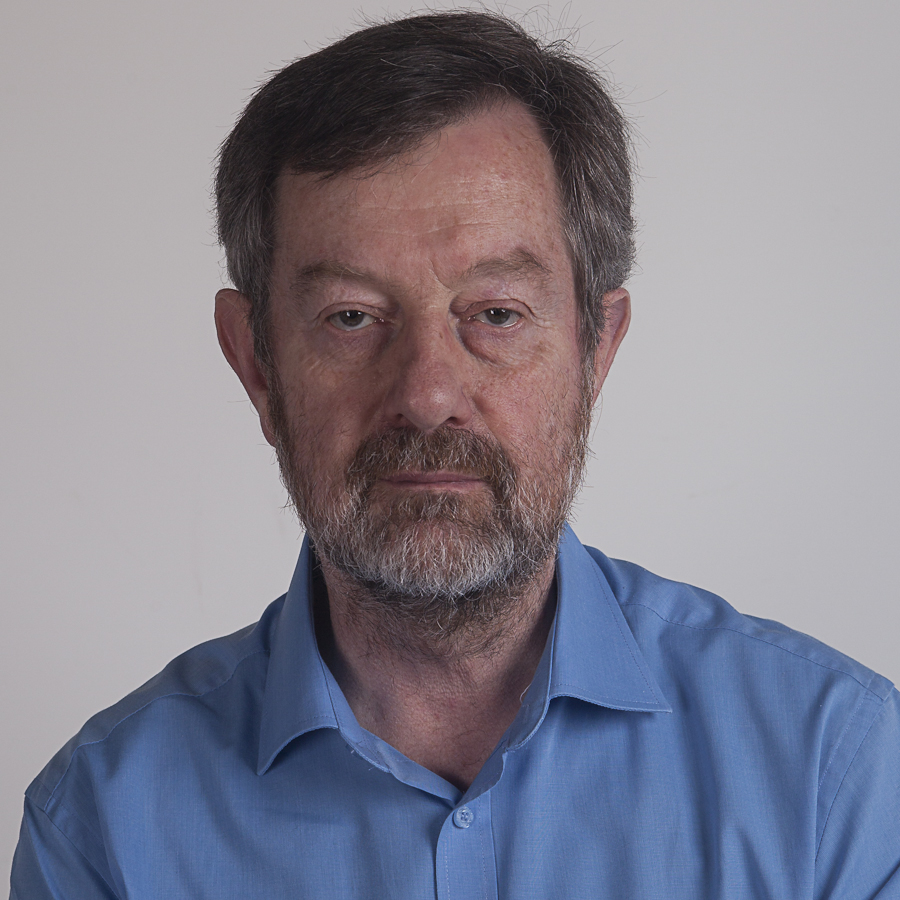
Chris Vivian is currently a co-chair of GESAMP Working Group 41 on ‘Ocean Interventions for Climate Change Mitigation’ (formerly the Working Group on Marine Geoengineering).
He retired from Cefas, the Centre for Environment, Fisheries and Aquaculture Science (an agency of the UK Department for Environment, Food and Rural Affairs) in October 2016 where he had 30 years’ experience in an advisory role to UK Government on national and international issues relating to the environmental impacts of various human activities in the marine environment.
He was a UK delegate in international meetings under the OSPAR and London Conventions dealing with waste disposal at sea in the North-East Atlantic and the whole world respectively. He was the Chairman of the Scientific Groups of the London Convention and London Protocol from 2008 to 2011 and was the Chairman of the OSPAR Convention’s Biodiversity Committee that dealt with species/habitat protection issues as well as the impacts of human activities from 2006 to 2010.
At the London Convention/Protocol meetings Chris was heavily involved in the discussions on ocean fertilisation and marine geoengineering from 2007 and chaired the working group that finalised the amendments to the London Protocol on marine geoengineering in 2013. He received a BSc in Geology and Oceanography in 1971 and a PhD in Marine Geochemistry in 1975, both from the at University College of Swansea in Wales.
Phillip Williamson, Honorary Reader, School of Environmental Sciences, University of East Anglia

Phil Williamson has mostly worked for the UK Natural Environment Research Council (NERC, now part of UK Research and Innovation), based at the University of East Anglia as a programme Science Coordinator. His main areas of expertise are in global climate change – how it affects natural systems and society, and what we can do about it – and ocean biogeochemistry, including the ocean carbon cycle and marine ecosystems.
Following initial research in the 1970s on invertebrate ecology (both terrestrial and marine), Phil led the planning and implementation of a wide range of national and international research initiatives, including work for Plymouth Marine Laboratory and the International Geosphere-Biosphere Programme. Topics included marine zooplankton dynamics, microbial biodiversity, ocean-atmosphere interactions and climate geoengineering.
Phil’s work for NERC at UEA included science coordination of the UK Ocean Acidification research programme (co-funded by NERC, Defra and DECC), the Shelf Sea Biogeochemistry programme (co-funded by NERC and Defra), and the UK Greenhouse Gas Removal programme (co-funded by NERC, other Research Councils and BEIS). Phil has led two reports on climate geoengineering for the UN Convention on Biological Diversity (CBD); has co-authored reports on ocean fertilization for the Intergovernmental Oceanographic Commission (IOC-UNESCO) and on ocean acidification for OSPAR and the CBD; and was a lead author for the Intergovernmental Panel on Climate Change (IPCC) Special Report on Ocean and Cryosphere in a Changing Climate, also its Summary for Policy Makers and Glossary, all published in September 2019. His current research interests focus on the role of the ocean in carbon dioxide removal, including the effectiveness of coastal ‘blue carbon’ as a nature-based climate solution.
Phil has authored more than 100 other scientific publications, including six in Nature. Together these have achieved more than 3,500 citations. He has given many interviews for television (including BBC World News, Sky News and CNBC), radio (BBC R1, R2 and R4, Talk Radio, CBC and many regional radio stations) and print media, and has written articles for The Conversation and the popular press (including The Spectator).
Ishita Yadav, South Asia’s Regional Focal Point on SDG7, United Nations Major Group for Children and Youth

Ishita Yadav is a deeply passionate youth advocate for climate equity and a social-justice activist. She serves as South Asia’s Regional Focal Point at the SDG7 Youth Constituency under the United Nations Major Group for Children and Youth and facilitates YOUNGO’s (youth constituency to the United Nations Framework Convention on Climate Change) Cities Working Group. At the SDG7 Youth Constituency, Ishita coordinates at the Youth Sustainable Energy Hub (a financial capacity building platform for youth-led energy projects) and has contributed to numerous policy advocacy initiatives.
As a Climate Solutions Journalism Fellow at One Earth, Ishita has written numerous award-winning pieces on climate mitigation efforts led by grassroot communities. Ishita has been involved in the climate governance sphere for several years and specializes in renewable energy, geoengineering and sustainable intergenerational policymaking.
Highlights
“How did the Convention on Biological Diversity address Solar Radiation Modification and how have discussions on its governance evolved?”
Phillip Williamson
Honorary Reader, School of Environmental Sciences, University of East Anglia
“What are the key legal issues surrounding the governance of Solar Radiation Modification?“
Simone Borg
Professor, Environmental & Resources Law, Faculty of Laws, University of Malta
“Why must Marine Cloud Brightening be combined with strong climate actions to save the Great Barrier Reef?”
Daniel Harrison
Principal Investigator of the Marine Cloud Brightening for the Great Barrier Reef project, Sydney Institute of Marine Science
“What are the key challenges with the Marine Cloud Brightening experiment in Australia?”
Daniel Harrison
Principal Investigator of the Marine Cloud Brightening for the Great Barrier Reef project, Sydney Institute of Marine Science
“What can we learn from the governance of Marine Cloud Brightening research in Australia?”
Jan McDonald
New Star Professor of Environmental and Climate Law, University of Tasmania
“How can young people contribute to Solar Radiation Modification governance?”
Ishita Yadav
South Asia’s Regional Focal Point on SDG7, United Nations Major Group for Children and Youth
“What concerns and hopes can young people bring to governance discussions on Solar Radiation Modification?”
Ishita Yadav
South Asia’s Regional Focal Point on SDG7, United Nations Major Group for Children and Youth
